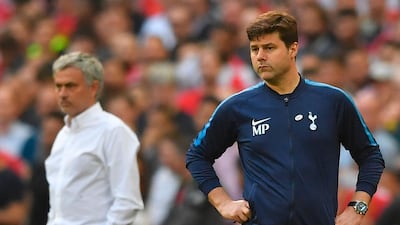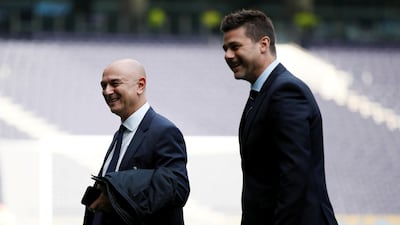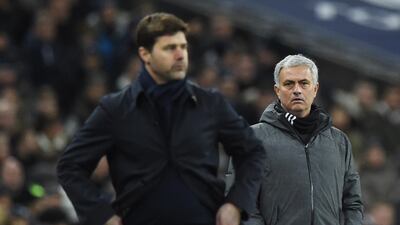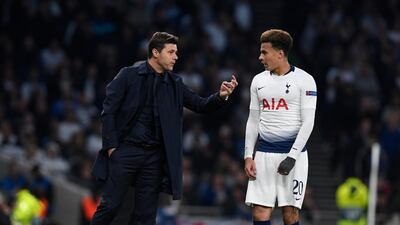Jose Mourinho and Mauricio Pochettino’s paths appeared to be intertwined long before the events of the last 48 hours. Rewind 11 months and, after the Portuguese’s sacking at Old Trafford, Pochettino was installed as the favourite to replace him.
Tottenham responded with an awesome display to demolish Everton 6-2 and go two points behind champions Manchester City. Their increasingly overworked press officer had to intercept questions about Manchester United before the Argentinian could answer them.
Pochettino was a man in demand, seemingly the subject of a three-way tug of war between Spurs, United and Real Madrid. He stayed at Spurs, partly due to Zinedine Zidane’s surprise reappearance at the Bernabeu and Ole Gunnar Solskjaer’s unexpected success as United’s caretaker, but partly due to the £40 million cost of buying him out of Tottenham.
Like much else, it now looks like a case of 'Levynomics' gone wrong. Pochettino has been sacked, pocketing a £12 million (Dh 56m) pay-off. Tottenham chairman Daniel Levy's attempts to play hardball have backfired.
Money feels at the heart of much at Tottenham. Pochettino’s achievements – reaching the Champions League final on a £29 million net spend over five years and with a wage bill only slightly higher than Everton’s, securing four consecutive top-four finishes – were exacerbated by the austerity. Tottenham’s stunning first half of last season and the subsequent exercises in escapology that took them to the brink of European glory amounted to a particularly large sticking plaster.
Ultimately, Pochettino was wounded, psychologically and in a footballing perspective, by their inability to sign anyone for 18 months. His chairman – and former buddy on an Argentinian rafting trip – Levy had forged a reputation as a master of brinkmanship, but by pricing Christian Eriksen out of a move at £130 million and failing to sell Toby Alderweireld or Danny Rose, he cost Tottenham a small fortune and Pochettino the budget and the chance to fully rebuild. Nor did he dispose of Serge Aurier or Victor Wanyama.
Whereas Pochettino’s finest Spurs sides had cohesion and conviction, energy and enterprise, his final team, the one that was fortunate to draw with Sheffield United, bore a makeshift look. Eriksen, Alderweireld, Rose and Jan Vertonghen, the quartet who could leave for free when their contracts expire, did not take the field. None has flourished this season and Spurs had the transitional feel of a group trapped between past and future.
________________
Mourinho returns
________________
Pochettino’s relationships were fractured. Public challenges to his board to spend more were Mourinho-esque; he said in the summer that his title should be downgraded to head coach. A galvanising force became more of a sulker. Displays of unhappiness spilled over into performances. Spurs lost their unity and, with it, their capacity to be greater than the sum of their parts.
His bond with his players was once one of his greatest strengths, but a band of brothers felt broken. Pochettino had wanted some out and, while he had reintegrated Rose and Alderweireld in previous campaigns, now there were too many eyeing the exit.
Problems were compounded by footballing issues. Hugo Lloris’ errors became more frequent. Dele Alli and Eric Dier’s form dropped after injuries. Spurs never really recovered from Mousa Dembele’s physical decline (though, in Tanguy Ndombele, Pochettino may have bequeathed Mourinho the ideal successor).
His finest team, the side of 2016-17, were powered by their full-backs, but a strength became a weakness. A side defined by pressing was older and slower. Tottenham lost their intensity and then their identity.
Pochettino camouflaged it at first. In the first half of last season, he excelled at being inventive, reimagining the same players in different systems. This season, however, his selections felt ever more erratic; inspiration had been replaced by desperation. Nor could he use his coaching prowess to conjure exponential improvement from players forever. Not when some were regressing.
Tottenham’s return of 25 points from Pochettino’s last 24 league games was representative of performances, albeit interrupted by famous European nights against Borussia Dortmund, City and Ajax.
Pochettino shocked most when, on the brink of the Champions League final, he talked of walking away. He may now wish he had: he only has that sizeable pay-off, plus memories of rancorous underachievement, to show for those sorry final few months.
As he perhaps feared then, he would never build a second superb side. He was Tottenham’s finest manager since Bill Nicholson and he left them in 14th, below Sheffield United, Bournemouth, Burnley and Brighton. The exit of a sacked manager was unbecoming, but the failings were not all his.





















